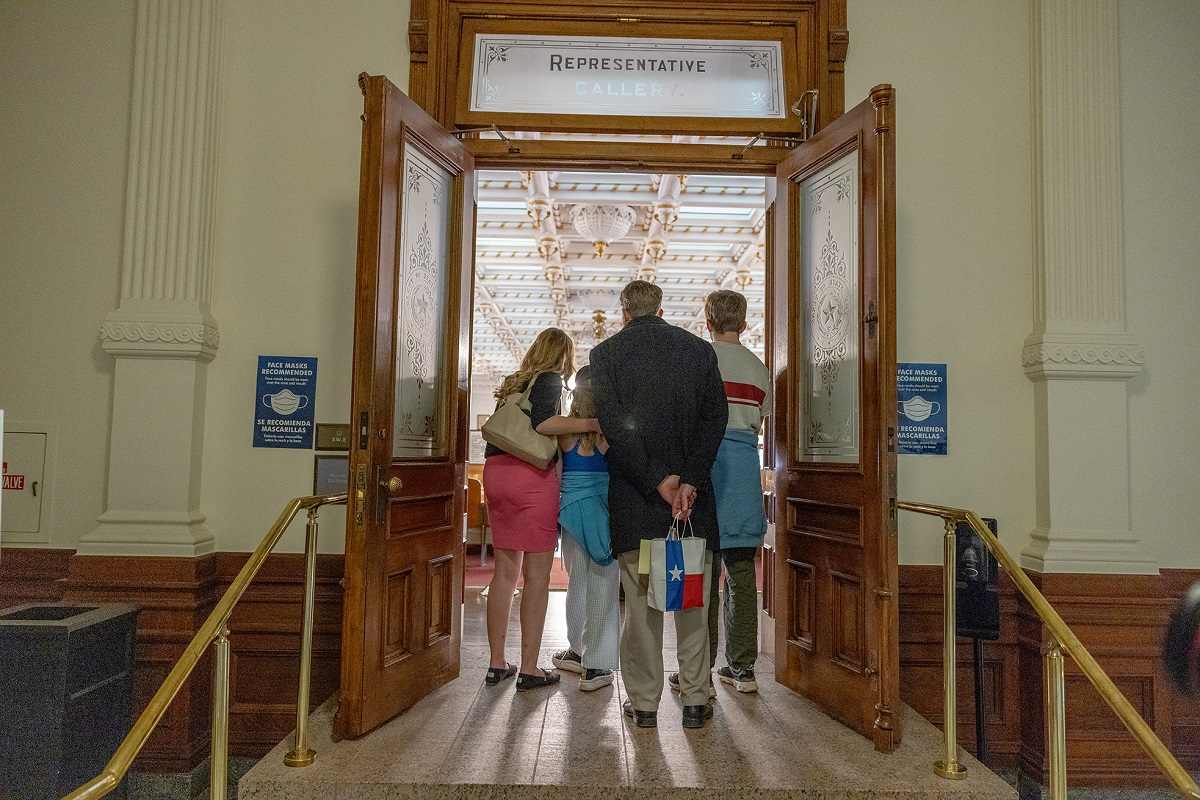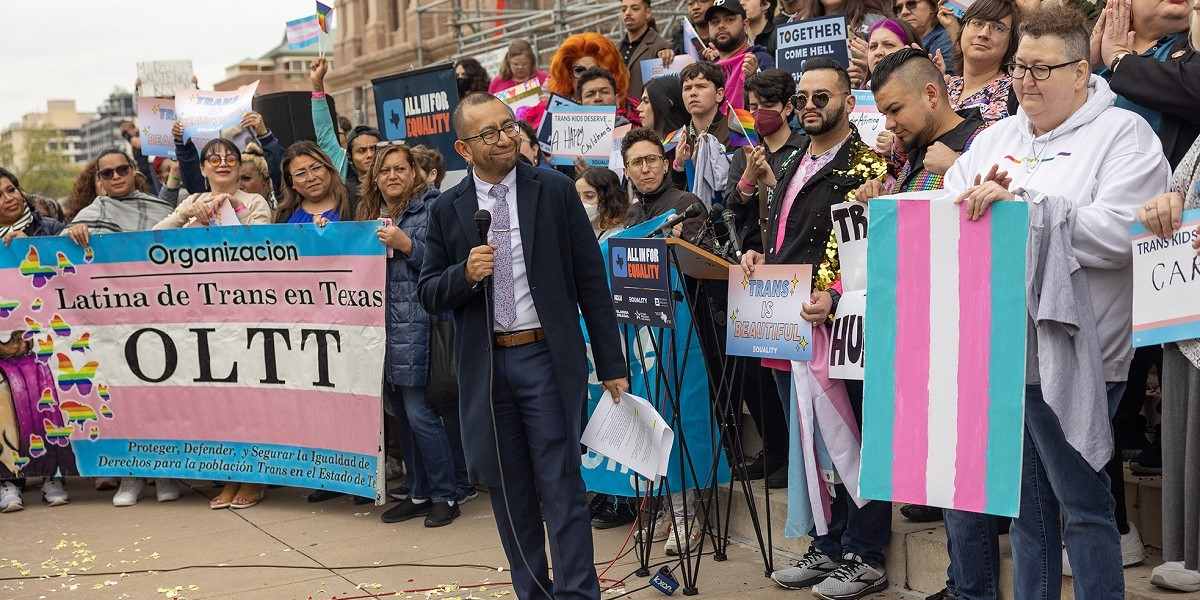
The Briggle family from left – Amber, Mae, Adam and Grayson – enter the viewing gallery for Texas House of Representatives on March 20.
12:23 JST, April 11, 2023
AUSTIN, Texas – Amber and Adam Briggle don’t talk to their children about their family’s emergency exit plan. The preparations are made quietly, in the background of daily life: The car is kept up-to-date on maintenance, always with a full tank of gas. The carriers are ready for the cats. Amber and Adam know the shortest route across the Texas border, and they know where they’d stay for the short term, while they figured out the family’s next step. Lawyers are poised to tell them when it’s time to leave, should it come to that.
“If the kids know,” Amber said, “it would keep them up at night, and them losing sleep over this is not going to change the situation one way or another.”
This is the situation: Amber and Adam have a 15-year-old son, Grayson. He is a soft-spoken, gentle child, a devoted big brother to his 10-year-old sister, Mae. Grayson is a decorated athlete, an honors student and a gifted musician. He is also among the more than 29,000 transgender children estimated to live in Texas, where lawmakers this year have filed at least 140 bills that target LGBTQ rights. (All children in this story are identified by their middle names or initials to protect their safety).
What this means is that nothing about Grayson’s future in his home state is certain anymore. After years spent fighting – and mostly defeating – mounting waves of anti-trans legislation, the Briggles and other families of trans children in Texas now find themselves at a place of unprecedented peril. Lawmakers have introduced the most extreme slate of anti-trans bills to ever come before the state legislature, including bills that would ban gender-affirming health care for trans youth; censor discussions and libraries in public schools; punish district attorneys who refuse to prosecute parents for child abuse for providing gender-affirming care to their children; and preempt a local government’s ability to enact laws that enshrine equality – meaning even trans-inclusive families in progressive bastions like Austin or Houston might not find sanctuary there.
To parents like Amber and Adam, the cumulative effect of this flood of bills can be distilled to one explicit truth: “It is life or death for these kids,” Amber said. Take Grayson, their flourishing child, and strip away his ability to live as himself, and his parents know exactly what’s at stake. Their fears are echoed by leading medical experts: Trans kids already experience significantly higher rates of depression and suicide attempts, and major medical associations have voiced alarm that the rising tide of anti-trans legislation will put these children at even greater risk.
At this moment of utmost urgency, Amber said, families like hers also feel alone, with no sign of rescue on the horizon. “It feels like nobody cares,” she said. “There’s no pushback coming from the business community anymore. There’s no action coming from the White House. Where are all the allies? We’re out here, left to fend for ourselves.”
For years, Amber, a 45-year-old small business owner, has testified repeatedly before the legislature, spoken publicly about her family, written about their experience, and shared resources and personal stories on a Facebook page with more than 23,000 followers. Last year, she stood onstage at the GLAAD Media Awards and talked through tears about what her family endured after Gov. Greg Abbott (R) directed the state’s Department of Family and Protective Services (DFPS) to open child abuse investigations against families who provide gender-affirming care to their children. Amber and Adam, a 45-year-old philosophy professor, were among at least 15 families who were reported and investigated for child abuse. Of these parents, the Briggles are the only ones to publicly identify themselves. They feel certain that their vocal activism made them a target.
But the alternative is not an option, they say, especially now. When they learned that LGBTQ organizations in Texas would host a rally for equality in Austin followed by visits to the offices of state lawmakers on March 20, Adam and Amber decided they would make the 250-mile drive south to participate. It would be a 15-hour day, and the kids would miss school, but they were resolute.
“None of us want to be doing this,” Amber said, “but we all understand that we have to.”
When they arrived in Austin, Amber was startled and heartened by the size of the crowd in the church where activists and allies had assembled before marching to the Capitol. “This is the most people I have ever seen in this room,” she said, as fellow parents came to greet and embrace her. It felt like something of a miracle, because Amber knew how many families like hers had pivoted from fight to flight, seeking safety in other states or countries. Advocacy events like this one were akin to family reunions, she said, “and the family here is getting smaller.”

The Briggle family and the Rev. Eric Post walk past the Texas Capitol following the rally on March 20.
It was, to date, the largest LGBTQ rally to take place at the Texas Capitol, with more than 700 people who had RSVP’d to attend, according to Equality Texas, the advocacy nonprofit that organized the event. The Briggles marched with hundreds of others to the Capitol under overcast skies, the air laced with the smoke of copal incense burned by the Indigenous activists who led the way. They chanted “No hate in my state!” and “Trans lives matter!” as they approached the towering building, their voices reverberating against the granite facade.
Ricardo Martinez, chief executive officer of Equality Texas, was among the first to address the crowd. “It has been a tough road over the course of the last three years, and you’re going to hear a lot of hate being thrown around carelessly – but that doesn’t belong to us, because we are joy,” he said, and the crowd answered according to his direction: We are, we are, we are.
“We are authentically ourselves, and there’s so much bravery in that,” Martinez said.
Amber wrapped her arms tightly around Mae, and the two swayed gently together. Grayson stood close to his father, his hands shoved into the pockets of his blue hoodie, his eyes on Martinez.
“I think you’re so brave,” Martinez told the people standing before him.
“We are,” Grayson murmured, his voice lost to the thundering chorus: “We are, we are.”

Ricardo Martinez, chief executive officer of Equality Texas, addresses the crowd in Austin on March 20.
***
At home, Adam and Amber don’t talk about politics. They want their kids to be free to live their childhoods, so they focus instead on the usual chaos of family life – school and work and friends, Mae’s dancing and Grayson’s music lessons. There is plenty to offer distraction, and that mostly works, until the kids go to bed and the house is still.
“I lay down at night, and my brain is processing it all,” Amber said. “I have been having horrible nightmares for months.” Sometimes she dreams that her family is running from mobs of violent attackers; other times, they are trapped in a building as it fills with rising floodwaters. There are nights when she barely sleeps at all.
Not long ago, this reality seemed unfathomable. The targeting of LGBTQ people in Texas, and transgender kids specifically, began as a trickle; a 2017 bill that would have regulated bathroom use for transgender Texans ultimately failed, despite being championed by Lt. Gov. Dan Patrick. In 2019, a sweeping “religious refusal” bill – which would protect licensed professionals who wished to deny services to anyone who defied their religious beliefs – was met with strong pushback by the state business community. By 2021, when Amber first joined other families in testifying before the legislature, Texans were facing a historic wave of anti-trans legislation, and the state passed a law barring trans kids from competing on sports teams that aligned with their gender identity.
After the 2021 session, families like the Briggles felt some measure of reprieve – until February 2022, when Texas Attorney General Ken Paxton (R) authored an opinion asserting that gender-affirming treatment for trans adolescents, including puberty-blocking medications, “can legally constitute child abuse.” This set the stage for Abbott’s directive, and only days after it was issued, Amber and Adam learned that their family was under investigation. The Briggles later joined a lawsuit filed by Lambda Legal and the ACLU against Abbott and DFPS, and in September, a Texas state judge issued a temporary injunction shielding the Briggles and members of the LGBTQ organization PFLAG from investigations stemming from Abbott’s directive. By that time, the case against the Briggles had been closed.
Abbott’s office did not respond to a request for comment by The Washington Post.
The impact of Abbott’s directive remains chilling, Amber said. Parents who might otherwise testify or speak publicly to defend their families now fear that their words will be used against them: “Now that [Texas] is criminalizing parents,” she said, “who is going to speak?”
In the beginning, Adam said, their family never expected to be at the front lines of this issue. “Amber and I talk a lot about how it would have been better to be anonymous from the get-go, but we just couldn’t foresee what we were getting into. When the 2015 bathroom bills came along, we thought it was just a misunderstanding, a flash-in-the-pan culture war, and if we just spoke up, it would dissipate,” he said. “But it’s only escalated. And so now there’s not only a heightened sense of responsibility, but the sense of danger is also heightened.”
The current legislative session runs through the end of May, and Amber keeps an updated spreadsheet of all the bills – who authored them, their current status, the impact each one might have on families like theirs. She shares it with her followers on social media, along with emphatic calls to action: “trans kids are just KIDS and they need YOU to be the grown up,” she wrote recently. “I know it’s weird and hard and scary, but imagine how trans kids feel. DO THE WORK so they don’t have to.”
Amber’s sense of resolve is real, but so is the feeling that surfaces in reflective moments, when she worries that she’s grown jaded, her optimism depleted. So far this year, at least 13 states have passed laws restricting gender-affirming medical care for children. Kentucky became the latest to do so on March 29, when state lawmakers overrode the governor’s veto to pass one of the strictest anti-trans laws to date.
“I see these bills everywhere, and it’s just one after another, boom, boom, boom. It’s Utah. South Dakota. Mississippi. Tennessee. Iowa. Line them up, watch the dominoes fall,” she said. “How do we ever fight our way back out of this? They are literally trying to erase these children from existence.”
But she isn’t defeated. “I do believe we’re going to win in the end,” she said. She just isn’t sure when the end will be.
“I think the reality is that nothing is going to change until more people pay attention,” she said. “Trans kids are a small minority, and supportive parents of trans kids are an even smaller minority. If they can come after me – a White, cisgender, upper middle class, college-educated business owner in a straight-presenting relationship, and threaten my parental rights? Next they’ll come for you, and you, and you.”
***
As an uncertain future bears down, there are questions looming over the lives of parents of trans children in Texas. Do they stay or leave? Defend themselves publicly, or guard their privacy? Depending on their age, how much does a child need to know about the threats they might be facing? Is it possible to truly prepare or protect them?
Just one year ago, Elizabeth – a mom of two who asked to be identified by her middle name out of concern for her family’s safety – couldn’t imagine living anywhere but Texas. She was adamant her then-9-year-old child, R., who is nonbinary and uses they/them pronouns, deserved to grow up safely in the only home they’d ever known.
After Abbott instructed child protection officials to investigate families like hers in February 2022, Elizabeth explained only the bare minimum to her children: The family had a lawyer, and R. needed to practice saying “I don’t want to talk to you without my lawyer present” in case a state investigator approached R. at school. At first, Elizabeth wasn’t certain her child understood the gravity of it, and that was fine; she felt like she’d been able to shelter R. from the trauma of what was happening.
On a drive home from school about six weeks later, Elizabeth noticed that R. seemed unusually quiet and pensive. Then, R. suddenly piped up: When I go to foster care, will they give me food that I like?
For Elizabeth, the question landed like a physical blow. “I said, ‘that’s not going to happen, that is not something you have to think about,'” Elizabeth said, but R. kept talking: “They said, ‘I’m scared that I’m going to have to go to foster care and live there forever because nobody is going to want me because I’m trans.'”
Elizabeth realized that her child had spent weeks mentally preparing to be taken away from their family; that, as a notoriously picky eater, R. was already parsing the logistics of this separation. “It was absolutely devastating,” Elizabeth said. “The sense of failure that you feel as a parent, that your child is already planning their life without you … that, to me, was the moment of recognition that I could not keep them safe.”
At the time, Elizabeth and her husband had recently started a special savings account, putting money away monthly, in case they wound up needing to pay legal fees to defend their family. A year later, they had enough to afford to move to a safer place. They searched for a Democratic state that could be their new home, and found a place where Elizabeth’s husband could relocate his job. They will move this summer, before any of the bills in Texas can be signed into law.
“I don’t feel like I’m abandoning Texas,” Elizabeth said. “Texas has abandoned me and my family.”
R. was angry at first, vehemently opposed to leaving their home, their friends and their church. Elizabeth had to explain to her child in a way they could understand: By the time R. starts the new school year in September, their teachers might not be able to use their correct pronouns anymore. R. might not be allowed to use the bathroom they want to use. If they choose to take puberty-blocking medication in the future, that might not be an option. “I had to spell all that out,” Elizabeth said. “I had to say, ‘Our choices are to stay, and this is what your experience will be; or we can go, and you can be exactly who you are in every way, and that is what we want for you.'”
But before they left, Elizabeth wanted R. to witness the strength and vibrancy of the queer community in their home state, so she brought R. to the rally at the Capitol on March 20. They visited the offices of legislators who support LGBTQ rights, and thanked them for their work. It was R.’s first time inside the building, and their last before moving away, and Elizabeth was determined that the experience be an empowering one.
“This is the most trans and nonbinary people that [R.] has ever seen in one space,” Elizabeth said as they stood among the crowd. R. was ecstatic to be introduced to Jonathan Van Ness, the nonbinary star of the reality show “Queer Eye,” who lives in Austin. Van Ness hugged R. and thanked the child for being there, and the two posed for a picture together. Later, as Elizabeth and R. walked the hallways of the Capitol together, R. was still overwhelmed by the encounter.
“I met Jonathan,” R. gushed with obvious joy, and this is what Elizabeth hoped her child would remember of Texas.
***
When Amber looks at Grayson, the teenager who now towers over her, with his kind smile beneath a mop of sandy hair, she sees a boy who is obviously thriving. She wants lawmakers to see this, too. “If they just meet him, they’ll see how amazing he is,” she said. “It’s hard to deny when he’s standing there in front of you.”
So she started calling the office of Texas House Speaker Dade Phelan (R) five weeks before her family came to the Capitol on March 20. She left messages with the staffers who answered her calls, she said, explaining that she wanted just five minutes with the speaker. The third time she called, she was told to fill out a form online to request a meeting. She did. No response came.
Weeks passed, and she called again, and finally there came an email. “Unfortunately due to scheduling constraints Speaker Phelan is unable to meet on March 20th,” a staff member wrote, according to correspondence shared with The Washington Post.
Amber wrote back: “Is there someone in your office who is available to meet with us on March 20, even if Speaker Phelan is unavailable? I’m not exaggerating when I say that this issue is life or death for my son, and I’m desperate to share my concerns with your office.”
A staffer replied: “I understand your frustration and apologize for the delay. I will see if someone from our office is available to meet.” Amber never heard back. Phelan’s office did not respond to multiple requests for comment by The Post.
Without an appointment, the Briggles decided to leave a packet of information with Phelan’s office on March 20, including letters from Grayson’s teachers and a collage of family photographs. But their efforts were thwarted repeatedly. The hallway to Phelan’s office was blocked, and a guard told them to come back that afternoon. When they returned hours later, another guard told them to try a different route.
“You’ll have to make an appointment, and someone will have to come down and get you,” said a third security guard, when Amber asked him how she could reach Phelan’s office.
“This is our last visit,” Amber said, “and we are not going to give up.” She pulled out her phone and dialed the speaker’s office. The man who answered said he couldn’t help her; she would have to leave her information with the policy office just across the hall. When the Briggles walked in, a staff member greeted them from behind a desk.
Amber explained that they were trying to deliver information to the speaker. She handed the staff member the folded papers. “Can you please make sure he gets that?”
“You’ve got it, I’m happy to do it,” the staffer said.
“Is there a book I need to sign?” Amber asked, wanting to make an official record of her visit.
“No, we don’t have those here,” the staffer told her.
“Okay,” Amber said. “How do people even get to the speaker’s office anymore?”
“Um, I guess through the stairs, sometimes?” the staffer offered.
Amber tried once more to explain what they wanted Phelan to know: that they were a trans-inclusive family, and there were many anti-trans bills coming before the legislature, and “we oppose all of them,” Amber said. She wanted the speaker to focus instead on issues that Texans care about – infrastructure, jobs, health care. “That’s the gist,” she said. “Thank you for hearing me.”
“Y’all have a great one,” the staffer said as they left the office.
Back in the hallway, Amber scowled. “She didn’t even take any notes,” Amber said. “None of those words are going to make it to the speaker, and I don’t even know if that packet is going to make it to the speaker.” In all her visits to the Capitol, she had never before been unable to access a lawmaker’s office. Her frustration bubbled over. “How the f— am I supposed to speak with the m—–f—— speaker of the House?”
“Language!” Mae scolded her mother.
“Mom, let’s just go,” Grayson said. “Please.”
Amber’s voice quieted. “It just shouldn’t be this hard.”
***
It had been 10 hours since the Briggles left home in the predawn darkness, and before embarking on the 3½-hour drive back, they sat down in a dimly lit corner of the Texas Chili Parlor near the Capitol. They talked about the day over enchiladas and nachos and the drone of ’90s alternative-rock in the background.
“I got as many hugs as I could today,” Amber said. “I just need that.” She kept thinking about the mother who came up to her earlier and told her about her young trans child, and how Amber’s Facebook page had felt like a vital lifeline. “She was like, ‘I can’t thank you enough, you were the resource I needed when I was looking for answers,'” Amber said. “And that was amazing.”
“That’s what we didn’t have,” Adam said.
Amber exhaled. “It’s just a reminder of how important visibility is.”
She wanted to hold on to these moments of meaning and connection, Amber said, but it was daunting, how tired they were, with so much still ahead. The following week, a Texas House committee would hear public testimony about a bill that would prohibit physicians from providing gender-affirming medical care to children under the age of 18; more than 2,800 Texans would register their opposition to the bill, while only 100 would record their support. A slew of other bills would follow before the session ended in May. The lawsuit filed against Abbott was expected to go to trial in the fall. Meanwhile, Mae had a dance recital coming up, and Grayson had ukulele lessons to practice for, and it was almost Adam’s birthday. They had their life together, and the ongoing work of defending it.
Amber asked the kids what they’d liked best about their day. “I thought the protest was pretty cool,” Mae said. “Sleeping in the car,” Grayson deadpanned.
“Adam, do you have a favorite thing from today?” Amber asked her husband.
“I just was happy nobody got shot,” Adam said, and Grayson nodded in agreement. The rally felt especially vulnerable, Adam said; all those people together, in the open. One more way that their state no longer felt safe.
“Should we get out of here?” Adam asked. He was talking about leaving Texas.
“No,” Grayson said. “I have my friends here. I mean, if we could move all my friends, and my school, and our whole city …” he shrugged. “But I only have three more years until I leave the States.” He planned to study music abroad someday, he said, maybe in Ireland.
“I do feel like we’re trying to just get through three more years,” Amber said.
“Two more legislative sessions. We can do that, right?” Adam asked. They sat quietly together, without an answer.
"News Services" POPULAR ARTICLE
-

Japan’s Princess Kako Marks 31st Birthday, Contributed to Key Events This Year
-

Arctic Sees Unprecedented Heat as Climate Impacts Cascade
-

Brigitte Bardot, 1960s Sultry sex Symbol Turned Militant Animal Rights Activist Dies at 91
-

At Least 7 Explosions and Low-Flying Aircraft Are Heard in Venezuela’s Caracas
-
◎竹増ローソン社長インタビュー〔1〕_20251228YGTGS000198_C-250x166.jpg)
Convenience Store Chain Lawson May Start OTC Drug Delivery in 2026
JN ACCESS RANKING
-

BOJ Gov. Ueda: Highly Likely Mechanism for Rising Wages, Prices Will Be Maintained
-

Japan Govt Adopts Measures to Curb Mega Solar Power Plant Projects Amid Environmental Concerns
-

Core Inflation in Tokyo Slows in December but Stays above BOJ Target
-

Osaka-Kansai Expo’s Economic Impact Estimated at ¥3.6 Trillion, Takes Actual Visitor Numbers into Account
-

Major Japan Firms’ Average Winter Bonus Tops ¥1 Mil.
























